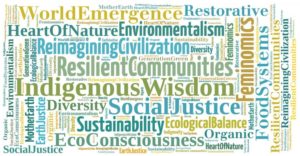This post was written by Ian Dechow ’18
The Localize It! Conference convened earlier this fall in South Royalton at Vermont Law School. The conference brought together speakers and participants who were passionate about system change via reinventing and reinvigorating local economies.
 One of the key points many of the speakers made throughout the weekend was on mindset. Changing mindsets about the current globalized economy is the first step towards changing the system as a whole. One of the ways speakers encouraged a change in mindset was to recognize that in our current system we commodify all aspects of our life. Indigenous Leader Sherri Mitchell pointed out that when people are “single,” one might say they are “on the market.” With this commodification comes the idea that acquiring money is the only part of the economy that matters. The Localize It conference sought to put this notion to rest.
One of the key points many of the speakers made throughout the weekend was on mindset. Changing mindsets about the current globalized economy is the first step towards changing the system as a whole. One of the ways speakers encouraged a change in mindset was to recognize that in our current system we commodify all aspects of our life. Indigenous Leader Sherri Mitchell pointed out that when people are “single,” one might say they are “on the market.” With this commodification comes the idea that acquiring money is the only part of the economy that matters. The Localize It conference sought to put this notion to rest.
Frances Moore Lappe, author of EcoMind: Changing the Way We Think, to Create the World We Want, explains that our current economic system gives us a scarcity mindset. Through perceived scarcity of resources, society creates a “spiral of powerlessness,” which leads to feelings of separateness and fear of the other, stasis, and a scarcity of goodness as well as an uber-competitive system. Her idea is that if we shift, as a society, from notions of limits to working within nature’s offerings then we can restore key elements to society that the scarcity mindset takes away: connection, meaning, and agency.
A key criticism of the current economic system is that wealth accumulates in a small number of hands. Chuck Collins, author of Born on Third Base, posits that the ultra-wealthy need to hold a stake in the future and help solve our global issues, such as climate change. The wealthy need to bring their stake to diverse communities to make it a place that is both equitable and sustainable through building up the local economy.
Values were emphasized as key to shifting economies to be local and sustainable. When a community is based on core values, which are integrated into everyday life through businesses and people, these values can become a reality. At the conference, the Breakout Sessions highlighted local organizations that are implementing these values and making this a reality. One of the breakout sessions highlighted how Montpelier, Vermont encouraged innovation and sustainability by having a design competition to redesign the downtown area. The prize money was incentive enough to bring in some smart, creative designs from all around the world, which were then displayed in a public way downtown for the community to consider and vote on. Including all stakeholders in these types of actions is integral to making lasting, positive change.
The process of making this change is almost as important as the change itself. At the conference, values were felt throughout the design and organization of the events. The conference provided meditation spaces and quiet spaces for reflection as well as time for this reflection. This allowed for the emphasis placed on healing and connection to be felt strongly. The conference also strove to provide entirely local food meals and the registration fees were on a sliding scale, so there would be no barriers to entry. In this way, the conference “walked the talk.”
The purpose of a conference such as Localize It is to create agents of change, who then can foster communities and spread ideals that steadily change our system for the better. In this way, Localize It hit the mark and, I believe, inspired participants and brought positive influence to the world.
